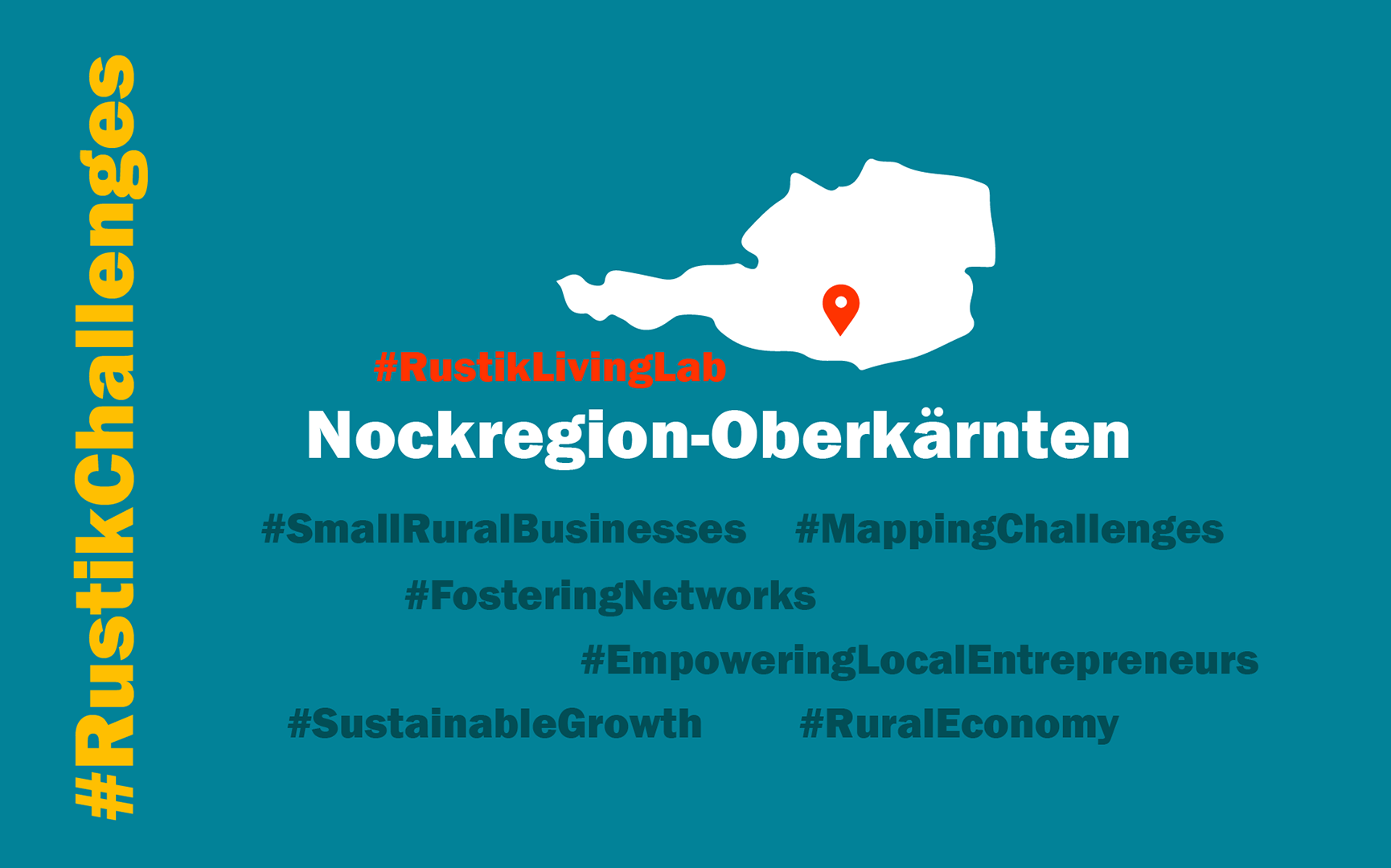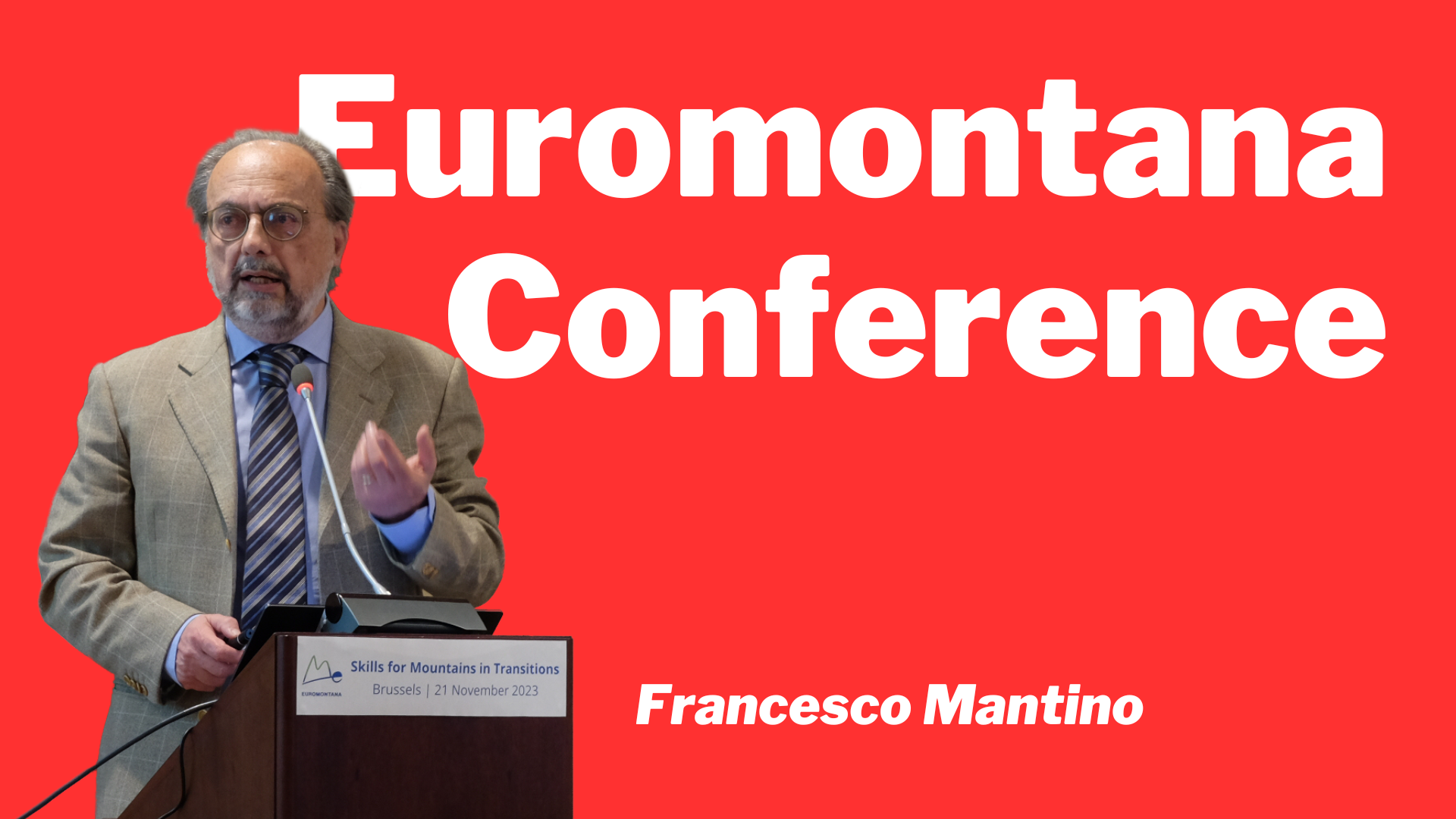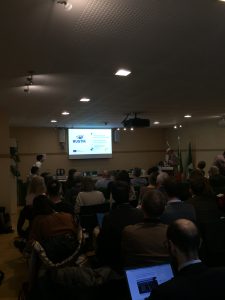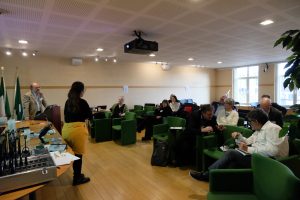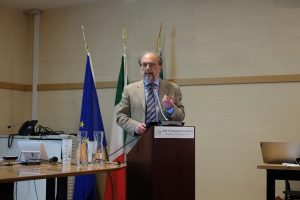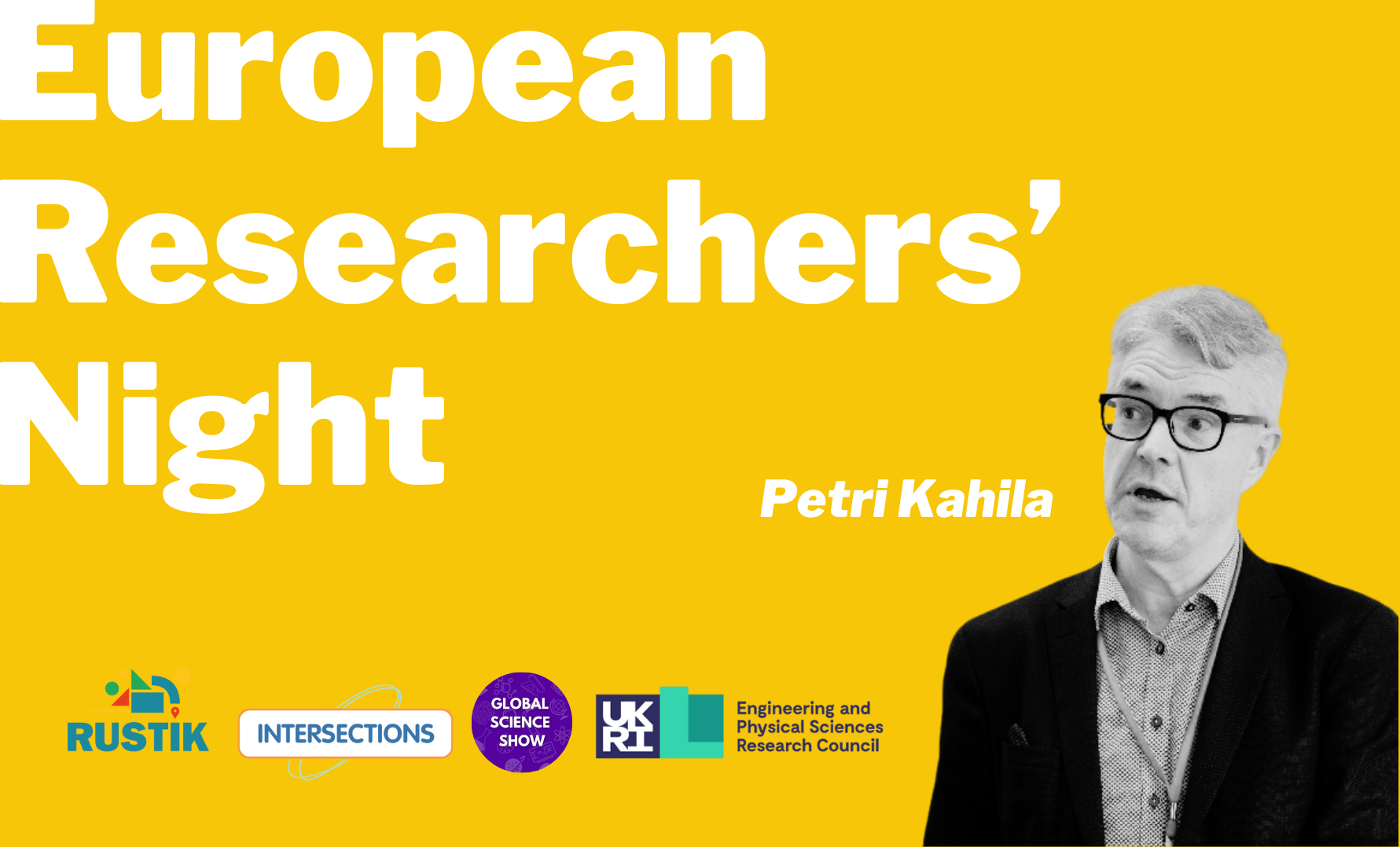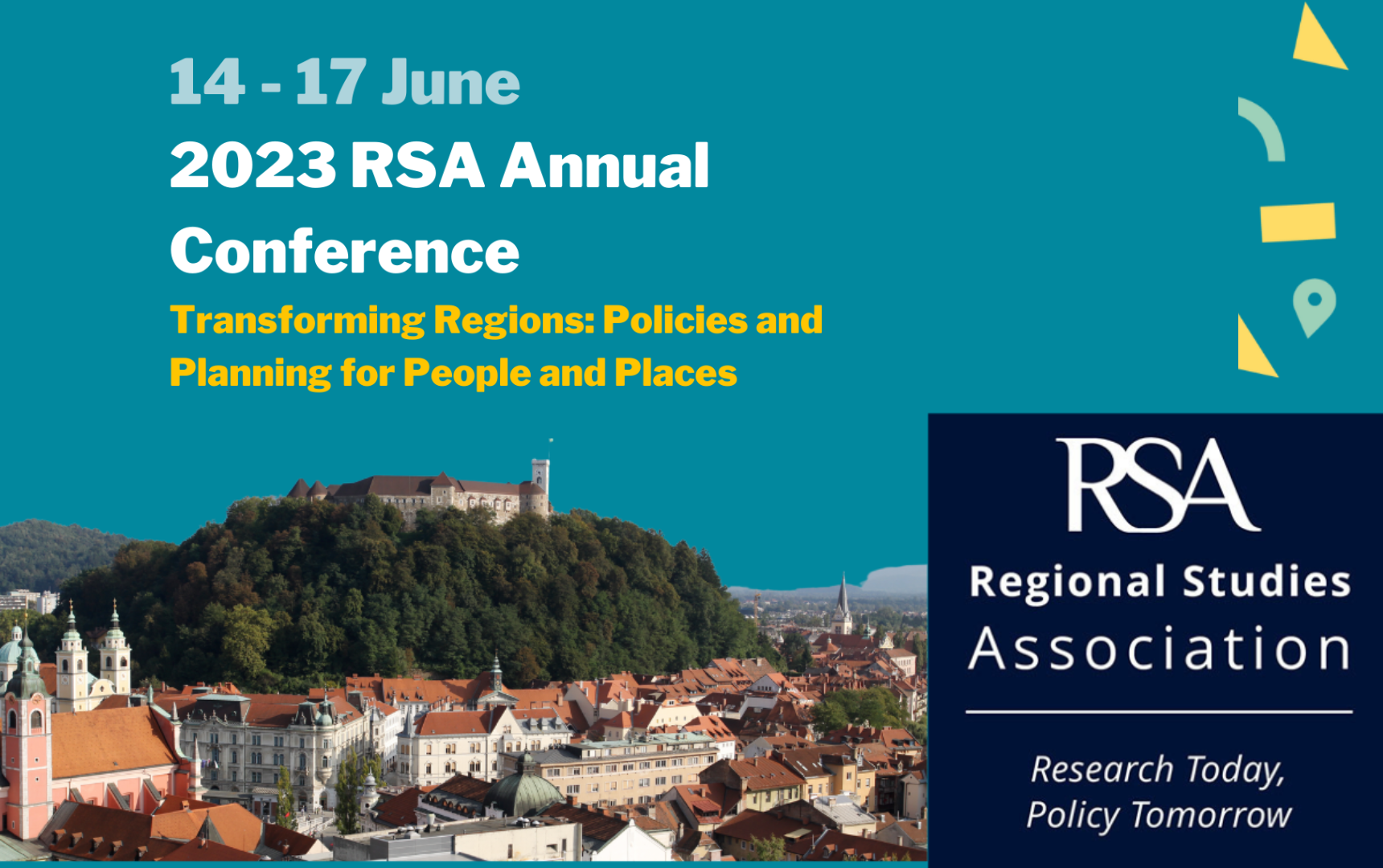The RUSTIK project’s Living Labs are paving the way for resilient rural communities in Europe.
Continue readingRUSTIK Living Lab in Austria’s Nockregion-Oberkärnten – Navigating the Future: Small Rural Businesses in Focus
Welcome to the inaugural Living Lab Report for the Austrian Pilot Region, Nockregion-Oberkärnten, situated in the heart of the Central Alps within Carinthia’s southernmost province. Covering 1,324 km² and encompassing 17 municipalities, this region grapples with the persistent challenge of population decline. With only 15% dedicated to permanent settlement, the economic landscape thrives on key sectors like tourism, agriculture, forestry, trade, industry, and construction.
Living Lab Challenge
Our Living Lab challenge focuses on Small Rural Businesses (SRB) in Nockregion-Oberkärnten. Initially exploring the application of a Quality of Life (QoL) Index, we redirected our attention to the more pertinent challenge of identifying the needs and challenges faced by SRBs and establishing a network to support them. This encompasses businesses, including farmers, with no more than 50 employees. The primary objective is to pinpoint data gaps, map the current regional state, and foster a comprehensive understanding of challenges encountered by entrepreneurs and business owners.
The groundwork laid will assess and justify the necessity of establishing a regional network/platform for SRBs. Envisioned as a central hub, this platform addresses challenges such as strengthening awareness of regional products, fostering value chains, facilitating joint training, enhancing negotiation power, addressing sustainable green business management issues, navigating rental space availability, managing challenges in employee recruitment and retention, and focusing on women as a specific target group.
Rationale
This approach rectifies oversights in previous projects by focusing on SRBs’ absence in regional strategies, especially during their foundation and takeover processes. The decision to spotlight SRBs aligns with their substantial contribution to the local economy, providing diverse employment opportunities. In Carinthia, small businesses constitute about 94% of all businesses, playing a crucial role in stimulating local activities and combating vacancies, contributing to the overall attractiveness of rural municipalities.
Knowledge to Date
Insights from expert interviews, PRP meetings, and literature research showcase existing business collaborations and challenges faced by SRBs in Nockregion-Oberkärnten. Previous initiatives like IGO and AGZ aimed at business settlements and sharing employees among different employers, underscoring the region’s efforts. Challenges, including limited time capacity for small business owners, difficulties in consolidating projects, and issues like employee retention and high rental prices, have surfaced through stakeholder engagement.
Research Questions
- What is the current state of the SRB landscape in Nockregion-Oberkärnten concerning the number of businesses, sector, branches, and employment sizes?
- What data points and indicators are relevant for stakeholders to describe or gain a better understanding of the current situation of SRBs? What are the opportunities and shortcomings
- What benefits do SRBs envision from a new platform or network, and how should it be structured to ensure acceptance?
Policy Relevance
To address the socio-economic transition, a holistic approach involving all sectors is deemed necessary. The Living Lab’s transition challenge aims to strengthen the position of SRBs in regional decision-making processes, aligning with the PRP’s objective of attracting new inhabitants and encouraging locals to stay. Establishing a network of SRBs is viewed as a critical step in adapting regional policies to address demographic change.
Emerging Data Needs
The Living Lab will focus on SRBs, aiming to identify and fill data gaps to understand their challenges and obstacles. Combining quantitative and qualitative local data will provide a comprehensive foundation for future strategies and decision-making.
Data Availability
While statistical data on workplaces, companies, and employees for SRBs is available, specific needs and challenges data are lacking. Expert interviews and consultations with stakeholders will be conducted to improve the knowledge base. OpenStreetMap data since 2012 will complement spatial analyses, providing insights into the spatial distribution of economic activities in the region.
RUSTIK participates at Euromontana’s Annual Conference: Navigating Transitions in Mountain Areas
In a resounding affirmation of its dedication to tackling the challenges and seizing opportunities in rural areas, the RUSTIK project actively participated in Euromontana’s Annual Conference—an integral component of the European Year of Skills. The conference, titled “Skills for Mountains in Transitions,” served as a convergence point for influential stakeholders, researchers, and practitioners, providing a dynamic forum to delve into the intricate transitions impacting mountain economies and labor markets.
Francesco Mantino, Architect of Rural Transitions:
Francesco Mantino, a prominent figure in conceptualizing rural transitions for policy-making, represented the RUSTIK project at a pivotal session. As the Council for Agricultural Research and Agricultural Economy Analysis and a partner in the RUSTIK project, Mantino contributed valuable insights during the conference. He spearheaded discussions on the challenges and opportunities for skills and employment in mountain areas, sharing the stage with distinguished speakers.
Mantino’s session, titled “Setting the scene: challenges, opportunities and approaches for employment and skills for mountain in transitions,” saw him collaborating with Guillaume Corradino, the Director of Euromontana. The duo laid the groundwork for understanding the intricate landscape of mountain transitions, discussing both challenges and innovative approaches.
Additionally, Mantino shared the stage with Kirsty Blackstock, from the James Hutton Institute and partner of the MOVING project. Their discussion delved into “Skills for the future of mountain value chains,” shedding light on the evolving nature of skills needed in these regions.
Rural Proofing for Mountain Areas:
Beyond the conference sessions, Mantino actively participated in the General Assembly, engaging in a parallel session on rural proofing. Drawing from RUSTIK’s deliverables, he presented case studies from Finland and the UK, offering a nuanced perspective on the application of rural proofing in mountain areas. The discussions proved to be a melting pot of experiences, allowing participants to identify challenges and needs for effective rural proofing implementation.
Euromontana’s Vision and Conference Focus
Against the backdrop of declining populations, loss of attractiveness, climate change impacts, and the imperative green transition, Euromontana’s conference aimed to spotlight the challenges and solutions for employment and skills in mountain areas. The overarching goal was to explore sector-specific difficulties and opportunities while brainstorming innovative solutions to attract talent to these regions.
In the spirit of collaboration, Euromontana provided a platform for representatives of the European Commission, researchers, and practitioners to share their expertise, shaping policy and practical solutions for talent attraction in transitioning mountain areas.
RUSTIK Shines at the European Research Showcase
RUSTIK made a remarkable appearance at the European Research Showcase, a significant segment of the European Researchers’ Night event held in September 2023. This event was orchestrated under the aegis of the Intersections 2023 UKRI funding project, signifying its importance in the world of research and innovation.
At the heart of this event was the mission to foster public engagement and facilitate the dissemination of research findings across a spectrum of fields, spanning sustainability, history, virology, and more. One of the voices representing RUSTIK at this gathering was Petri Kahila, the Director of the Karelian Institute at the University of Eastern Finland.
During his engaging presentation, he provided valuable insights into the RUSTIK project, particularly its significant role as the leader of Work Package 4: Evidence and Indicators in Practical Strategy & Policy Implementation. In addition to shedding light on the project’s objectives and contributions, Petri Kahila took the opportunity to give attendees a glimpse into a day in the life of a researcher specializing in social sciences.
As an esteemed expert in a multitude of domains, including regional and local governance, social and territorial cohesion, rural policy, and evaluation results, Mr. Kahila brought forth a wealth of knowledge and experience. His presentation not only underscored the paramount significance of the RUSTIK project but also unraveled the profound intricacies of social science research. This research serves as a linchpin in molding policies and strategies that uplift and enhance the well-being of communities and regions.
Bryony Goodwin-Hawkins, Senior Research Fellow affiliated with the Countryside and Community Research Institute at the University of Gloucestershire and WP3 leader, took also the stage at the European research showcase, shedding light on the fascinating world of living labs. At the forefront of innovation within RUSTIK project, this endeavor boasts 14 living labs that serve as dynamic ecosystems for the transformation of inventive concepts into tangible solutions. These living labs act as crucibles of experimentation, harnessing the power of emerging data insights to guide and navigate the intricate landscape of rural transitions. Bryony’s presentation highlighted the invaluable role of these living labs in fostering sustainable development and sparking innovation in rural communities.
About the European Research Showcase
The European Research Showcase is a grand stage where over 60 researchers from diverse fields across Europe take the spotlight. This illuminating event spans two enriching days, from September 29th to 30th, commencing at 9 a.m. and concluding at 9 p.m. CET each day. The rich tapestry of content generated during the event finds its home on various social media platforms, including Twitter, Instagram, and TikTok.
Audiences are not passive spectators, but participants are encouraged to engage by watching the showcase, posing questions, and immersing themselves in the content. The ultimate goal is to accentuate the international and intersectional nature of research and emphasize its far-reaching impact on multifarious aspects of society, ranging from societal and policy issues to health and economics. At the helm of this initiative stands the Intersections project, steadfast in its mission to forge a platform where researchers and the public can unite in an enlightening exploration of the world of research.
RUSTIK Colleagues presenting at RSA Annual Conference in Ljubljana
The Regional Studies Association’s Annual Conference is just around the corner, and we are excited to announce the participation of several esteemed colleagues from the RUSTIK project. The conference, organized in collaboration with the School of Economics and Business, the University of Ljubljana, and the Slovenian Ministry of Cohesion and Regional Development, will provide a platform for knowledge exchange and discussion on a wide range of topics related to regional and urban development, policy, and research.
The RSA Annual Conference in Ljubljana promises to be a stimulating event, and our RUSTIK colleagues will be actively contributing to the knowledge exchange. The following partners will be actively participating in the conference:
- Institute for Rural Development Research, WP7 Project management, administration, and coordination leader, represented by Simone Sterly
- University of Gloucestershire, WP3 Implementing Living Labs in 14 Pilot Regions leader represented by Bryonny Goodwin-Hawkin
- Federal Institute of Agricultural Economics, Rural and Mountain Research, WP5 Refined understanding of rural dynamics, impact assessment, and conclusions leader, represented by Ingrid Machold, and of course, the University of Ljubljana, represented by Ilona Rac.
- “Entrepreneurial Ecosystems and Challenge-oriented Regional Innovation: A Research and Policy Agenda for European Startup Villages”
- Date: Thursday, June 15 | Time: 2:00 PM – 3:30 PM CEST
Bryonny Goodwin-Hawkins, along with Fabrizio Guzzo, Fernando Merida Martin, and Simone Sasso, will present a paper that focuses on entrepreneurial ecosystems and challenge-oriented regional innovation. Based on their work with the JRC for the Startup Village Forum, the presentation will shed light on the EU’s Long-term Vision for Rural Areas and discuss a research and policy agenda for European startup villages.
- “Conceptualising Functional Rural Areas: Policy Directions and Research Foundations”
- Date: Friday, June 16 | Time: 2:50 PM – 4:20 PM CEST
Simone Sterly, Project Coordinator, and Bryonny Goodwin-Hawkins, Living Labs Coordinator will be presenting a compelling paper in this session. The paper, titled “Exploring Functional Rural Areas: New Pathways for Multifunctional Rural Regions,” and prepared together with the consortium members Franco Mantino, Ilona Rac, and Aimee Morse, delves into the conceptualization of Functional Rural Areas which is directly based on the work developed by the RUSTIK Consortium on rural functionalities
This research, rooted in the RUSTIK Consortium’s work, offers valuable insights into policy directions and research foundations in this emerging field. We look forward to their presentation at the RSA Annual Conference and the stimulating discussions it will generate among scholars, policymakers, and researchers interested in the future of rural-urban dynamics and regional development.
- “Accommodation and Housing of Asylum Seekers and Recognised Refugees in Rural Areas – Two Cases from Rural Austria”
- Date: Friday, June 16 | Time: 2:50 PM – 4:20 PM CEST
Ingrid Machold will present a paper that examines the accommodation and housing of asylum seekers and recognized refugees in rural areas, focusing on two cases from rural Austria. While this paper is not directly related to the RUSTIK project, it highlights the importance of supporting our colleagues and their valuable research.
- JRC SMARTER Conference Stream Policy Dialogue Session: “Making Policy Work for Future Generations – Sustainability Transitions as a Long-term Recovery” –
- Date: Friday, June 16 | Time: 4:50 PM – 6:30 PM CEST
Bryonny Goodwin-Hawkins will be participating in the JRC SMARTER conference stream policy dialogue session, where she will interview Slovenian MEP Frank Bogovic. Additionally, she will contribute to a panel discussion with Lars Coenen and Peter Benczur. The session aims to explore sustainability transitions as a long-term recovery strategy.
Don’t miss out on the chance to be part of this enlightening conference!, the RSA Annual Conference is a remarkable platform for sharing knowledge and fostering collaboration in the field of regional studies. Our RUSTIK colleagues’ presentations highlight crucial areas such as entrepreneurial ecosystems, functional rural areas, and refugee accommodation in rural settings. Their contributions will undoubtedly enrich the conference and inspire fruitful discussions among attendees. We wish them all the best for their presentations and look forward to the valuable insights they will bring back to our RUSTIK community.


